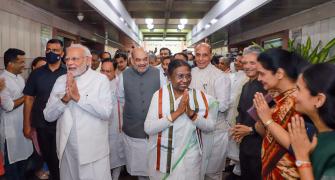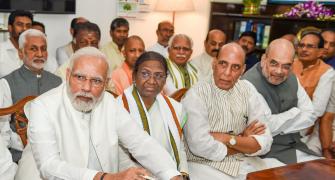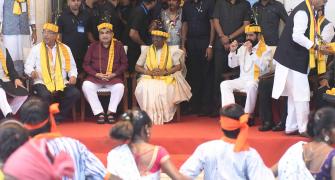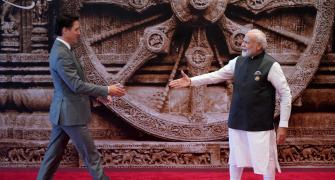There were many people who wanted to seek favours from her by offering lakhs and crores of rupees when she was Odisha's transport minister.
She never allowed any kind of corrupt practices to touch her department officials, family members or the supporters who have stood by her.
A fascinating excerpt from Kasturi Ray's Droupadi Murmu: From Tribal Hinterlands to Raisina Hill.
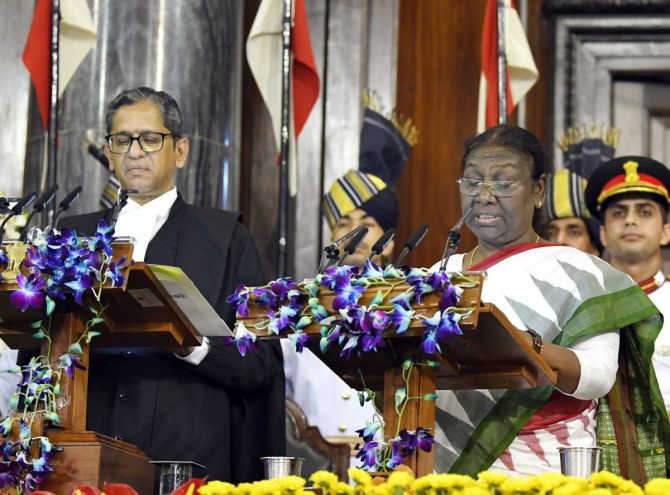
Droupadi Murmu loved to participate in events and gatherings even while being minister. Be it birthdays, weddings, club functions, plantation drives or even typical tribal cockfights -- a simple invitation would suffice to draw her to places.
A perfectionist to the core, Murmu was never criticised for her work. She was known among her colleagues as a punctual leader for her resolve to reach every meeting ahead of schedule. In every village she visited, the villagers welcomed her with open arms. Probably Murmu was among the very few politicians who allowed people to meet her as and when they wished.
Murmu was accommodating and adjusting irrespective of the situation she was in. When her in-laws objected to her working in Bhubaneswar, she left her job without a single argument. She also got back to work and entered politics after her husband encouraged her to do so.
Sources close to the family say that there were many people who wanted to seek favours from her by offering lakhs and crores of rupees even through her family members when she was the transport minister. But her family members were averse to such deals.
And Murmu, being a staunch disciplinarian, never acceded to such nefarious deals. She never allowed any kind of corrupt practices to touch her department officials, family members or the supporters who have stood by her.

However, she always paid heed to her close confidants when they requested her to help someone in dire need. Satish Samal reminisced:
Some people kept approaching the minister for grants for one reason or another, and she used to send those people to me so that I could make a list of them and present it to her. I would take the liberty of picking some names from the list and request her to grant a few thousand rupees to people who needed it for medical emergencies or other urgent issues. Jokingly, she would retort, 'So you have become the minister to decide who will get what!'
Murmu was assigned government quarters in Unit 6, Bhubaneswar, where she would call her near and dear ones once in a while and spend time with them. Being a foodie, she cooked various dishes herself and served them to the people present there.
As Delha Soren remembered, there have been many occasions when she and her family have visited Murmu in the quarters and eaten together. In those days, Murmu used to be a non-vegetarian and there was a flood of delicacies cooked and partaken by all. Soren remembered:
But there were occasions when she did not have a house allotted in her name and she used to stay in the guest house or circuit house. On some days, she would just ring me up and say she was fed up eating guest house food. She would urge me to cook something typical to our community like saag for her. I would immediately cook and call her home. She has come to our house many times just to have a good meal.

'When an Adivasi walks, it becomes dance, when an Adivasi speaks, it becomes a song, and Madam Murmu personified this,' Gandhian Aditya Patnaik explained, citing a Mundari saying that goes, 'Sen gi susun, kazi gee durang, doori gi dumang' [Walking is dance, speaking is song and the body is mandar (drum)]. This is the life philosophy of the Adivasis.
'The most inspiring aspect of Madam Murmu's journey is her village Uparbeda, which made her strong in the face of challenging situations, and today we have one of the strongest personalities as the President,' Patnaik said.
Looking forward to seeing Murmu at a new height of her career, he said, 'I hope she sticks to her own identity and honesty, which are her forte. Despite being nominated by a party, I believe she will not compromise on principles.'
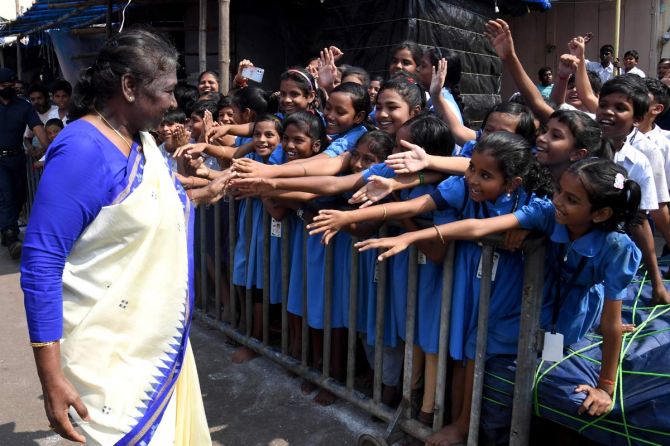
Murmu once again contested from the Rairangpur constituency as the BJP candidate in 2004. The JMM's Ramchandra Murmu was her contender. Till the last round of counting, the two contenders were neck-to-neck.
At one point in the last round, when Murmu was leading by 1,500 votes, she fell unconscious due to exhaustion. Days of electioneering had taken a toll on her health. However, she won by a narrow margin of 42 votes.
'I was the first one to congratulate her. It is the people's mandate and they vote for development. If people chose her, it must be respected,' said Ramchandra Murmu after she was elected President.
'She is like an elder sister to me. Whenever I have asked her for some help for people in the constituency, she has always come forward. Even my friends who had approached her for some help with my reference were welcomed and heard. Their problems were also solved,' he remembered.
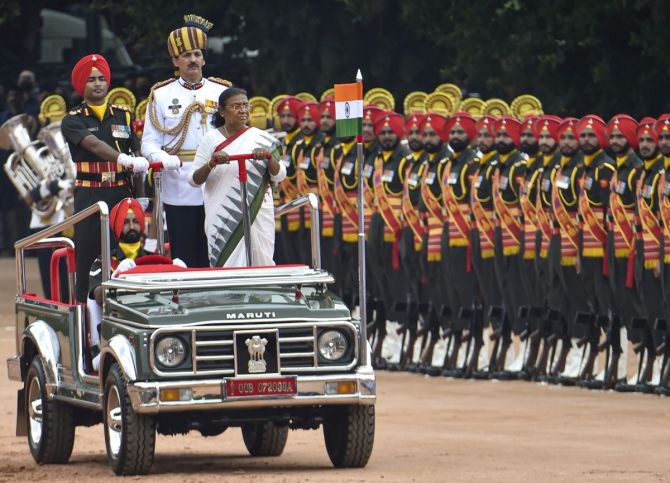
Murmu's concern for the people and her fearless nature came to the fore in an incident from 2006. This showed that she was active directly on the ground rather than restricted to her desk.
On 2 January, violence over displacement at Kalinga Nagar in Jajpur rocked the state. This was caused by one of CM Patnaik's important steps to bring in industrialisation in the state --setting up of a Tata Steel plant in the area.
As the tribals got this information, around 500 of them from Chandia, Gobarghati and Champakoila villages, armed with tribal weapons, including bows and arrows, reached the site of the proposed plant, where ground-levelling work was underway. The police had already been deployed in the area.
Upon reaching the site, the tribals started pelting stones at the police, who tried to disperse them with tear gas shells and rubber bullets. However, the tribals were unrelenting and reportedly used crude bombs and arrows.
On the fateful day, a policeman was caught by the tribals and butchered in public. This caused the police to open fire at a mob of the tribals, who were protesting the rehabilitation packages handed out to them, indiscriminately.

Fourteen tribals, including a woman, were killed on the spot, and the protesters took the bodies of four of the tribals who had been killed with them.
With her tribal roots, it was a testing time for Murmu. She was not in the ministry but a legislator and, more importantly, a tribal leader from the BJP and the then state president of the BJP's Scheduled Tribe Morcha. She wanted to meet the tribals, and she did after the situation calmed.
According to Morada MLA Rajkishore Das, she visited the Kalinga Nagar site and discussed issues with the tribals. 'She probably wanted to stop the situation from escalating further,' said Das.
Even though she was associated with the BJD-BJP alliance, her primary concern at that moment was the tribals. Hence, she decided to visit Kalinga Nagar without even thinking of the ramifications her visit could have.
'I came to know that she visited the spot as a government representative as well as an Adivasi. She was heard to have met the protesters not as a leader but as one among them and convinced them that the situation would improve,' said Das.
Excerpted from Droupadi Murmu: From Tribal Hinterlands to Raisina Hill by Kasturi Ray, with the kind permission of the publishers Rupa Publications India.
Feature Presentation: Aslam Hunani/Rediff.com

